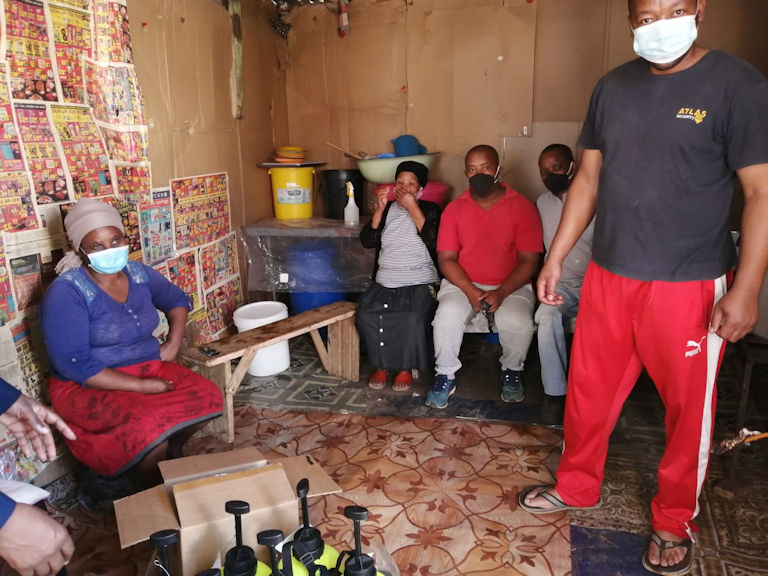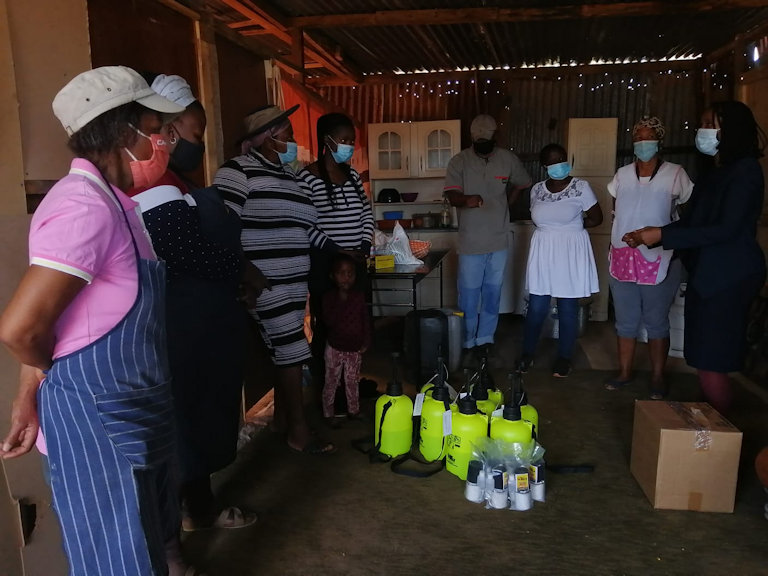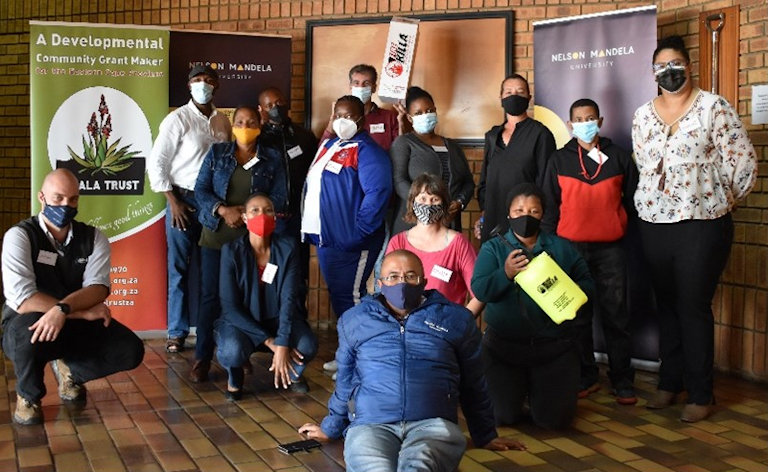As the threat of the third wave ballooned over the last few weeks, a much-anticipated event addressing another threat to communities – that of runaway fires – had to undergo a re-think.
It was to be the next step in the FireKilla Pilot Project: Masixhobe Siwulwe Umlilo: a collaboration spanning sectors, connecting different units and entities at Nelson Mandela University (the Hubs of Convergence, eNtsa, and Emergency Medical Care) to a local small business (FireKilla™), a long-established local non-governmental organisation (Ikhala Trust), and a number of informal, community-based organisations from across Gqeberha and Kariega.
As the Nelson Mandela Bay district’s COVID-19 numbers began to climb, the collaborating partners agreed, despite their disappointment, that the most responsible action would be to avoid gathering different groups of people from across the Bay.
“However, it is also known that the threat of fires is not going to wait out the third wave. Indeed, it might become an even greater threat if livelihoods are affected and families are confined to their homes for long periods of time again,” said head of Mandela University’s Hubs of Convergence, Dr Bruce Damons.
“It becomes particularly urgent now, as the country is again subjected to rolling power outages as part of the national power utility’s load shedding programme.”
As such, the team quickly shifted to a back-up plan, to personally deliver the FireKilla fire extinguishers to each of the participating community groups; making use of WhatsApp to share the demonstration videos. This included the basic fire safety training which was planned to be conducted in person.
This pilot project has been the culmination of numerous months’ worth of collaboration to address the peril of runaway fires.
The origin of the project lies within the response of the Convergence Fund, and its Deployment Committee (CFDC), to the manifold crises exacerbated by the COVID-19 pandemic in 2020. In its third cycle of funds disbursement, the Fund received requests for support from two communities in Nelson Mandela Bay that had been ravaged by fire.
While CFDC responded by providing a number of items that community members requested, the question arose as to what a sustainable response to the fire threat might look like. In the ensuing conversations, the Convergence Fund learned of a locally-developed alternative fire extinguisher that sought to make it both cheaper and simpler to stop a fire in its tracks.
The Fund approached the University’s engagement institute, eNtsa, which, through their Technology Station Programme, works with small businesses in an effort to stimulate and support local engineering innovation. eNtsa worked with FireKilla to test their extinguisher and by early 2021, engaged the Hubs of Convergence on the way forward.
“The Hubs of Convergence team knew just how the FireKilla extinguisher could be put to the test in the kind of conditions our local communities face, thanks to a successful collaboration in 2020 with Ikhala Trust,” said Dr Damons.
This collaboration with Ikhala saw Mandela University making a meaningful contribution towards sustainable food relief by supporting the work of a number of Community Kitchens. These are groups that have emerged to respond to the needs of their communities, most often through providing food along with other support, such as childcare, assistance with access to healthcare, and tending a community vegetable garden.
“This year, we are furthering our partnership with Ikhala Trust in an effort to extend and expand on the support provided last year to community kitchens across Nelson Mandela Bay and one located in George,” said Dr Damons.
The Trust was then called upon to help identify Community Kitchens that could be invited to participate in the Firekilla Pilot Project, drawing together groups from Wells Estate, Moeggesukkel in Kariega, Booysens Park, Kuyga, Jacksonville, and Zweledinga in Sea View. The University’s George Campus has also identified a community kitchen which is to be incorporated into the FireKilla project.
In April this year, the collaborating partners met at a workshop held at Missionvale Campus. Here, we learned about the work each Community Kitchen does, and about how the idea for the FireKilla extinguisher had come about. It was the news of a particularly devastating fire that had destroyed a large number of homes in an informal settlement in 2012 which led designer, Bryan Moulang, to this solution.
The resulting product is a completely manual, non-pressurized fire extinguisher, with cheap refills, which aims to make firefighting equipment more affordable and easier to maintain. The product design not only looked at a cost-effective solution but also something that can be used by people regardless of age and strength limitations.
The response to this product from amongst participating Community Kitchens was unanimously positive, and attendees agreed to form a steering committee to guide the process.
“It was this committee that decided that any hand-over of FireKilla units must be accompanied by training in fire safety to equip community members to respond effectively in the event of a fire breaking out,” said Dr Damons.
“We approached the university’s Emergency Medical Care department about the possibility of collaborating, and they responded with enthusiasm, volunteering to provide the training component for the collective.
The Convergence Fund Deployment Committee also responded enthusiastically, agreeing to match the Hubs of Convergence’s promise of four units and refills per Community Kitchen, making it an overall offering of eight units and refills for each of the seven kitchens.
“This presents a measure of security as communities face winter, which is the time in which fires are most likely to break out,” said Dr Damons.

Members of Yizani Sakhe community kitchen in Wells Estate receiving their FireKilla units

Members of Moeggesukkel Community Kitchen receiving their FireKilla units

The FireKilla Pilot Project workshop held in April 2021:
Standing, from left: Mr Luvuyo Bokwe (Moeggesukkel Community); Shelly Canzibe (Kuya Feeding Scheme); Nqaba Nqceke (Yizani Sakhe Community Building Program, Wells Estate); Zukiswa Pupuma (Booysens Park Community Kitchen); Bryan Moulang (FireKilla); Oyama Mkaza (ETP); Bernie Dolley (Ikhala Trust); Gavin Jordaan (Harvest Community Projects); Nadine Goliath (eNtsa).
Seated, from left: Dr Julien De Klerk (eNtsa); Ms Unathi Meslane (Ikhala Trust); Dr Bruce Damons (Hubs of Convergence); Ms Nicole Collier-Naidoo (Hubs of Convergence); Vuyelwa Mtyaleka (Emama Nutrition*)
[* the Emama Nutrition community kitchen couldn't continue their participation, and so the Zweledinga community kitchen has taken its place in the project]